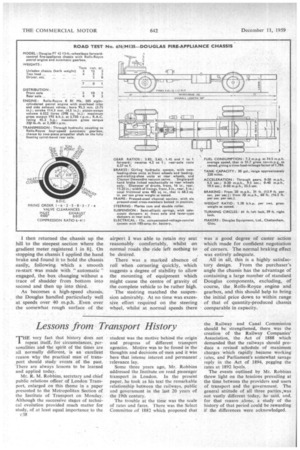Lessons from Transport History
Page 74

If you've noticed an error in this article please click here to report it so we can fix it.
'THE very fact that history does not I repeat itself, for circumstances, personalities and the spirit of the times are all normally different, is an excellent reason why the practical man of transport should study events of the past, There are always lessons to be learned and applied today.
Mr. R. M. Robbins, secretary and chief public relations officer of London Transport, enlarged on this theme in a paper presented to the Metropolitan Section of the Institute of Transport on Monday. Although the successive stages of technical evolution provided much matter for study, of at least equal importance to the c38
student was the motive behind the origin and progress of different transport agencies. Motive was to be found in the thoughts and decisions of-men and it was here that intense interest and permanent relevance lay.
Some three years ago, Mr. Robbins addressed the Institute on road passenger transport in London. In the present paper, he took as his text the remarkable relationship between the railways, public and government in the last 20 years of the 19th century.
The trouble at the time was the scale of rates and fares. There was the Select Committee ,of 1882 which proposed that • the Railway and Canal Commission should be strengthened, there was the creation of the Railway Companies' Association, the Act of 1888 which demanded that the railways should produce a revised schedule of maximum charges which rapidly became working rates, and Parliament's somewhat savage reply in the Act of 1894, pegging the rates at 1892 le_vels.
The events outlined by Mr. Robbins threw light on the tensions prevailing at the time between the providers and users of transport and the government. The general attitude of all three parties ,,was not vastly different today, he said, and, for that reason alone, a study of the history of that period could be rewarding if the differences were acknowledged.
























































































































